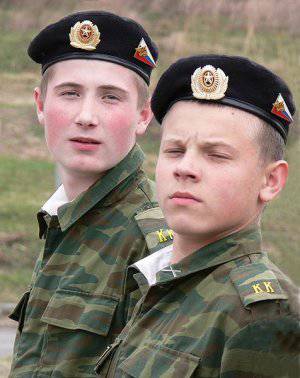Problems with training in military specialties in Russia
 The Soviet army ceased to exist a long time ago, the volumes of which were colossal, however, the system of training officers continued to be conducted according to the same principles as 25-30 years ago. The strength of the Russian armed forces is only one-fifth of the strength of the Soviet-era army, but it seems that, so far, military officials have not thought that training in military schools should undergo some changes. In the 90-s for obvious reasons, the training of officers proceeded by inertia, having received an impulse in the Brezhnev years.
The Soviet army ceased to exist a long time ago, the volumes of which were colossal, however, the system of training officers continued to be conducted according to the same principles as 25-30 years ago. The strength of the Russian armed forces is only one-fifth of the strength of the Soviet-era army, but it seems that, so far, military officials have not thought that training in military schools should undergo some changes. In the 90-s for obvious reasons, the training of officers proceeded by inertia, having received an impulse in the Brezhnev years.More recently, more than half of the graduates of military schools went to commerce, security agencies, and even directly to criminal communities. The lack of housing for Russian soldiers and neither reliable social guarantees frightened the graduates of military schools in our country. Young people, for whom the Ministry of Defense spent enormous amounts of money, said goodbye to the army very easily. These people are quite understandable. Those who remained boiling in this post-Soviet military cauldron realized that modern local conflicts did not go according to the scenarios described in the university textbooks. The enemy, it turned out, did not want to dig trenches and meet our Tanks in open fields, but, for some reason, prefers more and more guerrilla warfare, rear attacks and other things that young lieutenants were not taught for some reason. The first fruits of the complete discrepancy between the methodology and training program of the Russian officer corps we reaped in the first Chechen one. Pavel Grachev with a wide smile announced that Grozny would be taken within a week or two, but the "vile" Chechens, for the most part, apparently did not read Soviet textbooks and therefore were not going to surrender to the arriving federal troops.
Even then, the first words appeared about the fact that the Russian army needs not only upgrading weapons, but also specialists who understand how to conduct combat operations in new realities. Some immediately recalled that most Russian civilian universities have military departments. There were proposals to recruit the Russian army with highly qualified specialists who have technical specialties for managing new combat vehicles, which, in turn, for some reason, did not respond to graduates of military universities. Only now the military officials did not take into account that the lion’s share of graduates from these same departments were not going to become officers, but wanted to apply their knowledge in higher-paid areas of life. This was another step towards revising the approach to the training of cadets of military schools. If the Soviet Higher Military School implied that a young officer, receiving a diploma, automatically becomes the owner of a higher civil education, in the new Russia, with such a diploma further than in the parking lot security guard or as an OBZh teacher, it was almost impossible to get a job. The value of military education has dropped to the most critical point.
The army was supposed to become more compact and modern, and the top leadership of Russia increasingly began to declare a total modernization of the military department. At the same time, the management wishes to transfer the training system of Russian young officers to the rails of the Bologna concept of education. It is believed that at the present stage of the reform, the cadets will be taught under a special program: undergraduate - specialty - magistracy. The system, it seems, should revive the process of training military specialists, but the whole snag is that it is not always possible to make a good officer out of a silly schoolboy in 3 for a year, and he is also well-versed in modern military technology. In this case, the opportunity is given to “expand” the scope of their education in special higher military centers for training officers. As a result, the time of training one class specialist in the military field can take about 6-7 years and cost a lot of money. However, nothing else that could give a new impetus to the Russian armed forces has not yet been invented. Well, not to invite us, after all, also legionaries from among NATO sergeants to command a platoon ...
The reform of military training also included the development of pre-university training. Already in many large cities, the so-called cadet corps is providing substantial assistance. But here it was not possible to avoid problems. Under the guise of cadet schools, more and more, in the country, classes began to open in ordinary general education schools, which have nothing to do with the military cluster. Children enrolling in such classes do not even assume that they will receive a regular school certificate, which, for obvious reasons, does not give any guarantee of admission to a military college.
The situation is aggravated by the fact that the military-pedagogical personnel "lost" their potential during the years of financial turmoil.
In general, the state faces an extremely difficult task: to reconsider its view on the training of competitive military specialists, after conducting a large-scale reorganization of the majority of existing military schools. The main thing is that excessive zeal or half measures do not lead, as we often have to, to the creation of the next Colossus on clay legs instead of the efficient and mobile army of modern Russia.
Information